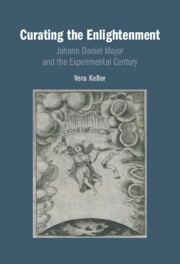
- Publisher:
- Cambridge University Press
- Online publication date:
- December 2024
- Print publication year:
- 2024
- Online ISBN:
- 9781009506854

How did the research universities of the Enlightenment come into being? And what debt do they owe to scholars of the previous era? Focusing on the career of German polymath Johann Daniel Major (1634–93), Curating the Enlightenment uncovers how late seventeenth-century scholars crafted the research university as a haven for critical inquiry in defiance of political and economic pressures. Abandoning the surety of established intellectual practice, this 'experimental century' saw Major and his peers reshaping fragments of knowledge into new perspectives. Across new disciplines, from experimental philosophy to archaeology and museology, they reexamined what knowledge was, who it was for, and how it was to be stored, managed, accessed, judged, and transformed. Although later typecast as Baroque obstacles to be overcome by the Enlightenment, these academics arranged knowledge in dynamic infrastructures that encouraged its further advancement in later generations, including our own. This study examines these seventeenth-century practices as part of a continuous intellectual tradition and reconceptualizes our understanding of the Enlightenment.
‘Keller is a masterful guide through the thickets of late 17th-century German academic culture and its colorful characters, collections, and publications. She traces the origins of research to this lost world, where curiosity and freedom from external interference allowed a shifting set of disciplines to form and in ways that proved seminal to the Enlightenment.’
Ann Blair - Harvard University
‘This is a bold, eye-opening book that debunks long-held prejudices about pedantic ‘baroque’ scholarship and the backwardness of 17th-century German science. Instead, it tells a whole new story: that of the ‘experimental century’, in which new, fluid changes are made in the knowledge system, and in which there is no contradiction between corpuscular physics, museum facilities and extensive citation practices.’
Martin Mulsow - University of Erfurt
 Loading metrics...
Loading metrics...
* Views captured on Cambridge Core between #date#. This data will be updated every 24 hours.
Usage data cannot currently be displayed.